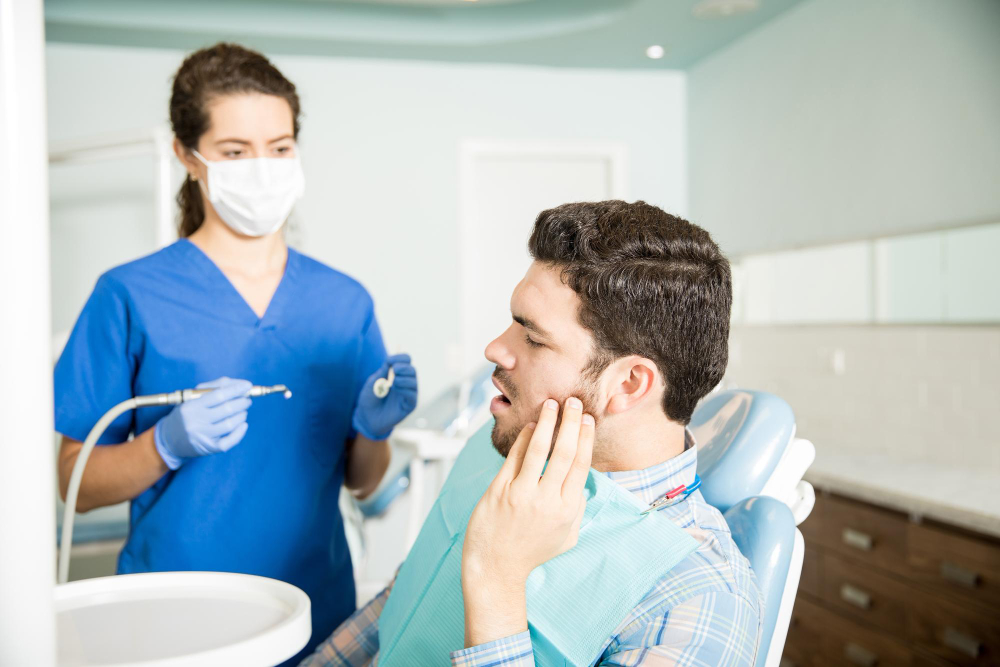
Dental crises can be excruciatingly painful, terrifying, and extremely inconvenient.
They often occur when you least expect them and require immediate attention to alleviate pain and prevent further complications. In such situations, it’s crucial to know what to do and where to turn for help. This guide aims to provide a comprehensive overview of emergency dentists, what dental emergencies entail, and how to handle them effectively.
A dental emergency is any situation that requires immediate dental care to alleviate pain, stop bleeding, or prevent further complications. Dental emergencies can occur due to various reasons, such as accidents, infections, trauma, or complications related to pre-existing dental conditions. It’s essential to distinguish between routine dental issues and true emergencies to know when to seek immediate care.
When To Seek Emergency Dental Care
Some signs and symptoms indicate the need for emergency dental care:
- Severe toothache
- Bleeding gums or mouth
- Broken or chipped teeth
- Knocked-out teeth
- Pus or swelling around the gums or face
- Loose or dislodged teeth
- Lost fillings or crowns
- Painful abscesses
- Injuries to the mouth’s soft tissues
- Objects stuck between teeth
- Orthodontic issues causing severe discomfort
If you experience any of these symptoms, it’s vital to seek emergency dental care promptly. Delaying treatment can exacerbate the problem and lead to more significant issues down the line.
The Role Of An Emergency Dentist
Emergency dentists are dental professionals who specialize in providing immediate care for patients experiencing dental emergencies. They are trained to handle a wide range of urgent dental issues and can quickly assess and address the problem. The primary roles of emergency dentists include:
- Diagnosing the issue: Emergency dentists perform a thorough examination to determine the cause of the problem and its severity.
- Providing immediate relief: They aim to alleviate pain, stop bleeding, and prevent further complications.
- Offering treatment options: After stabilizing the situation, emergency dentists discuss treatment options and may perform emergency procedures when necessary.
- Ensuring follow-up care: Emergency dentists may recommend follow-up appointments to address the underlying issue and provide long-term solutions.
How To Prepare For Dental Emergencies
While no one can predict when a dental emergency will occur, it’s wise to be prepared. Here are some steps you can take to be ready for unexpected dental mishaps:
- Know your dentist’s contact information: Keep your regular dentist’s contact details and office hours readily available.
- Research local emergency dentists: Identify nearby emergency dental clinics and save their contact information in case your regular dentist is unavailable.
- Understand your dental insurance: Familiarize yourself with your dental insurance policy, including coverage for emergency dental care.
Finding An Emergency Dentist
Locating an emergency dentist is crucial for timely care. Here are a few methods to find one in your area:
- Contact your regular dentist: If you have a trusted dentist, inquire about their emergency dental services and availability.
- Use online directories: Search online for emergency dental clinics in your area and make a list of options.
- Ask for recommendations: Seek recommendations from friends, family, or colleagues who have had emergency dental care.
- Call a helpline: Some regions have dental emergency helplines that can connect you with an available dentist.
When you find an emergency dentist, save their contact information in your phone and keep it in your emergency dental kit.
What Should You Expect From An Emergency Dental Visit?
When you visit an emergency dentist, here’s what you can typically expect:
- Immediate assessment: The dentist will perform a quick evaluation of your condition to determine the nature and severity of the issue.
- Pain relief: If you’re in pain, the dentist will prioritize alleviating it through various means, such as medication or dental procedures.
- Diagnosis: The dentist will diagnose the underlying problem and discuss potential treatment options.
- Emergency treatment: In some cases, the dentist may need to perform emergency procedures to address the issue.
- Follow-up care: You may be asked to schedule a follow-up appointment for further treatment or to address the underlying problem.
Common Dental Emergencies And Their Treatment
Let’s delve into some common dental emergencies and how they are typically treated:
- Toothache: Treatment may include pain relief medications, antibiotics if there’s an infection, or dental procedures to address the underlying issue.
- Broken or Chipped Tooth: Treatment depends on the severity of the damage. It may involve bonding, dental crowns, or, in severe cases, root canal therapy.
- Knocked-Out Tooth: Quick action is crucial. Try to place the tooth back into its socket, or store it in milk or saline solution, and seek immediate dental care.
- Abscessed Tooth: Treatment involves draining the abscess, which may require root canal therapy, antibiotics, or tooth extraction.
- Lost Filling or Crown: The dentist can replace the filling or crown to protect the tooth from further damage.
- Soft Tissue Injuries: Rinse the mouth with warm water, apply pressure to stop bleeding, and visit the dentist for stitches if needed.
- Object Stuck in Teeth: Gently attempt to remove the object with dental floss. If unsuccessful, seek dental care.
- Orthodontic Emergencies: Broken braces or wires may require repairs or adjustments by an orthodontist.
Tips For Managing Dental Pain At Home
While you should always seek professional dental care for emergencies, you can take some steps to manage pain at home:
- Rinse your mouth with warm saltwater to reduce inflammation and clean the affected area.
- Ibuprofen and other over-the-counter pain medicines can help lessen discomfort.
- Avoid hot or cold foods and drinks, as extreme temperatures can exacerbate pain.
- To reduce swelling, apply a cold compress to the affected area.
Remember that these are temporary measures, and you should still seek professional care as soon as possible.
Prevention Is Key
While it is critical to understand how to address dental emergencies, prevention is always the best strategy. To reduce the possibility of dental errors:
- Maintain good oral hygiene through regular brushing and flossing.
- Wear protective gear during sports or activities that pose a risk to your teeth.
- Avoid chewing on hard objects or ice, which can cause fractures.
- Schedule routine dental check-ups to catch and address dental issues early.
Dental emergencies can be stressful, but being informed and prepared can make a significant difference in how you handle them. Knowing when to seek emergency dental care, finding an emergency dentist, and understanding the common dental emergencies and their treatments are essential steps to take.


